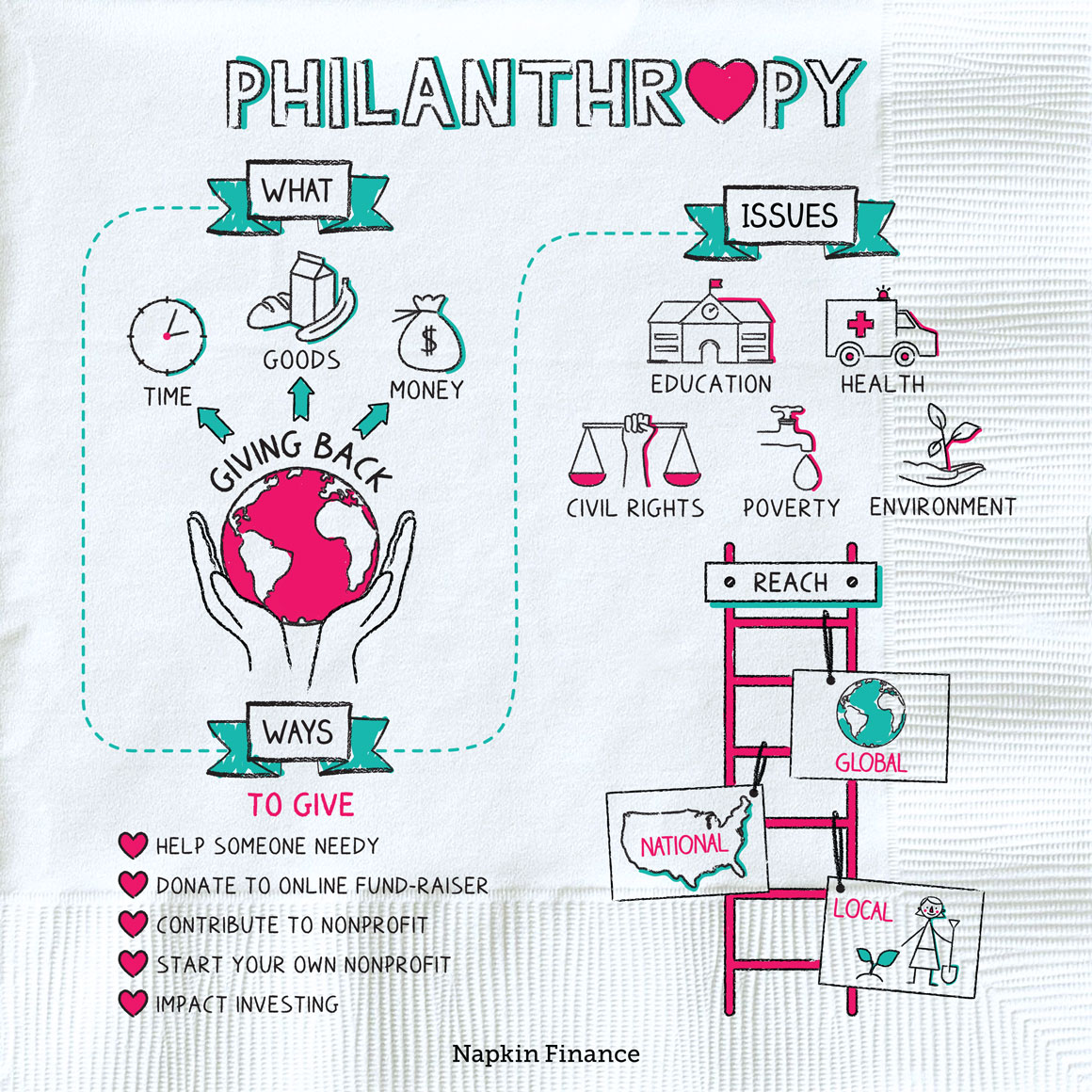Philanthropy
Greater Good


Philanthropy is giving back. It’s paying forward the resources you have—whether your money, or physical goods, or time and effort—to help someone in need.
Some people may get into philanthropy for the tax breaks, while others find it gives meaning to their lives and lets them connect with other people.
There are many ways to help, including:
- Helping a needy person in your area
- Donating to an online fundraiser
- Contributing money, canned goods, other belongings, or your time to a nonprofit
- Creating your own nonprofit to tackle a challenge no one else is working on
- Engaging in impact investing—putting your money to work in a way that should help it grow but also help society or the planet
You can give to an organization that specializes in a particular challenge, such as:
- Civil rights
- Education
- The environment
- Health
- Poverty
You can also consider what kind of geographic reach you want your giving to have, such as:
- Local—Help someone needy in your own backyard or volunteer at a local soup kitchen.
- National—Contribute to victims of a natural disaster, donate to a medical research organization, or work to protect U.S. conservation lands
- Global—Donate to help some of the world’s neediest. Help bring medical care to war zones, food to refugees, or education to children living in poverty.
Although people often use the terms interchangeably, there can be a difference between philanthropy and charity. Sure, both seek to make the world a better place, but:
- Charity typically involves contributing to an immediate need, often on a one-time basis—like providing clothes to victims after a tornado or leaving spare change in a donation jar.
- Philanthropy is usually a longer-term strategic contribution to address the cause of a social problem, such as funding a study to look at inequality or starting a nonprofit.
“To move forward, you have to give something back.“
—Oprah Winfrey
Unfortunately, not every organization that appears to give back is actually doing what it claims. Before offering up your time, money, or other resources, look out for red flags, such as:
- Requests for wire transfers or leaving money in a weird location
- Pressure to donate right now in person or over the phone
- Vague claims about the organization’s work or how it uses donations
- Company names that sound similar to those you’re familiar with
- Websites that lack detailed information
A little research and vetting can go a long way to making sure your donations will actually be put to good use.
If you’re in it for the tax breaks, there are rules you need to know. Donations to individuals—whether in real life or through crowdfunding—generally aren’t deductible. And you have to itemize your deductions in order to claim a benefit.
“I’ve always respected those who tried to change the world for the better, rather than just complain about it.“
—Michael Bloomberg
Philanthropy means giving money, time, or other resources to help someone in need. It can include donating to online fundraisers or even starting your own nonprofit. Philanthropy can differ from charity because philanthropy is a longer-term effort that seeks to address the cause of a social problem, whereas charity meets more immediate, short-term needs.
- The Giving Pledge is a pact—started by Warren Buffett and Bill and Melinda Gates—among many of the world’s billionaires to give away most of their fortunes. Almost two hundred people from around the world have signed on.
- Women are more likely to donate to charity than men and on average donate more money when they do than men.
- Some companies engage in giving through commerce. Prescription glasses retailer Warby Parker and shoe company Toms each give away one pair of their product for every one that’s purchased.
- Philanthropy is taking whatever resources you have in life—whether money, time, or expertise—and paying it forward.
- There are many ways to give depending on what you have to contribute and what kind of an impact you want to make.
- Philanthropy is often a longer-term effort to address the cause of a social problem. Charity, by contrast, is often a one-time contribution to meet short-term, immediate needs.
- Watch out for red flags before you send money to any charity group, including vague websites, pressure from unsolicited fundraisers, and familiar sounding corporate names.
- Giving can provide tax breaks, but there are rules and restrictions to claiming a deduction.




